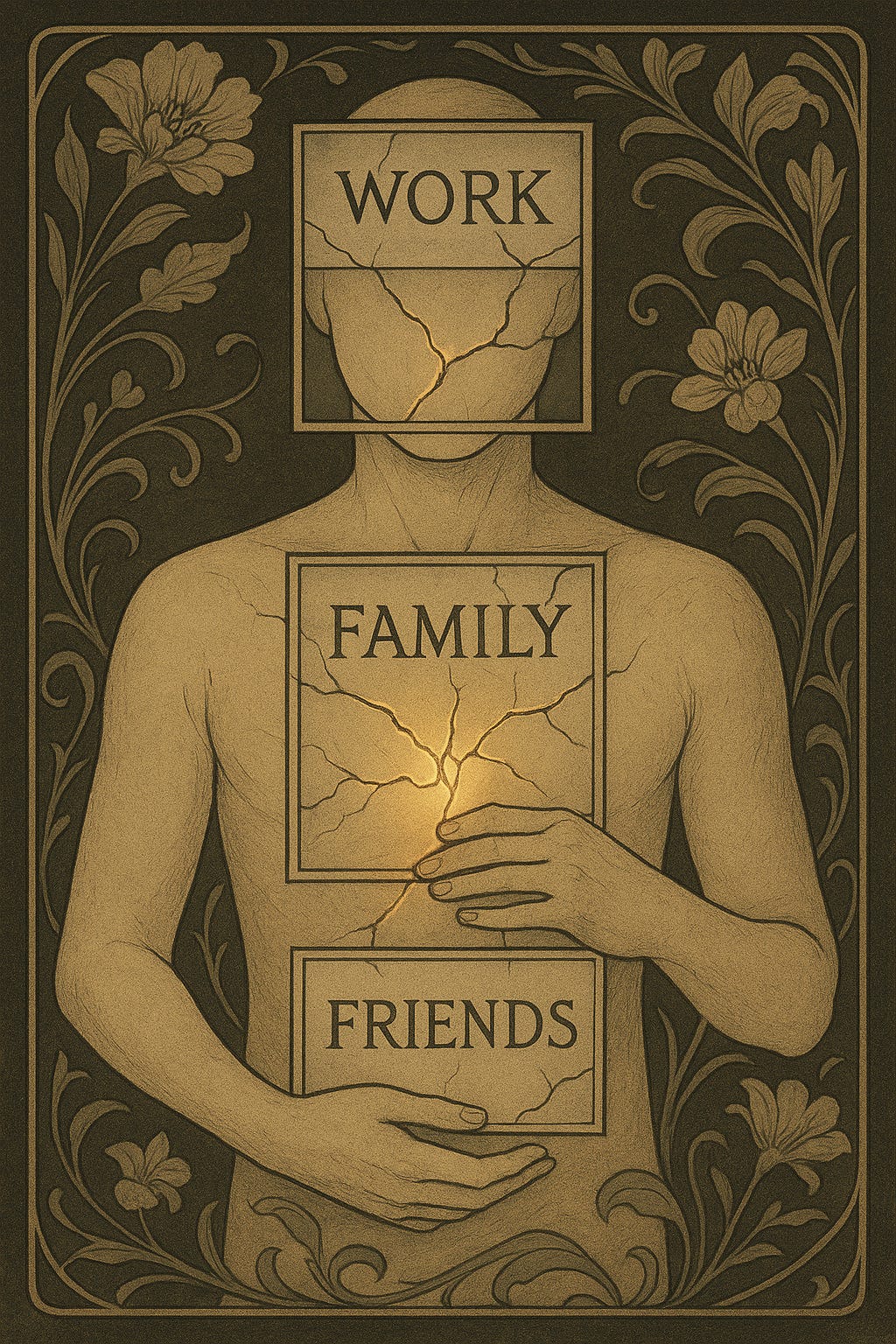Disappoint Others Before You Disappoint Yourself
Why living with integrity means learning to let people down
To the deep thinkers,
Welcome to the Deep Thinkers Newsletter: A collection of essays dedicated to going beyond the surface.
If you’re new here, check out the Deep Thinkers archive.
“Integrity means being whole, unbroken, undivided. It describes a person who has united the different parts of his or her personality, so that there is no longer a split in the soul.”
—Rabbi Harold Kushner
It hurts to disappoint someone you care about. So what do so many people do? They suppress who they really are to avoid it. The problem is, those suppressed feelings and thoughts will eventually manifest in one way or another—often impacting the very people we wanted to protect in the first place.
Avoidant liars (something I’ve often been) tell themselves they’re being empathetic when they lie to protect someone's feelings. They convince themselves there's nobility in sticking around when they know they should leave. But this isn't empathy, it's selfish and cowardly.
That's why a parent saying "I'm not mad, I'm disappointed" cuts so deep. Disappointment reveals the gap between who we are and who someone needs us to be. But as we grow and claim agency over our lives, disappointing others may be the closest we ever get to true freedom.
In one of my past relationships, the main issue we had was my need for compartmentalization. That is, sectioning off different parts of my life. My friends, my girlfriend, my family—all went into separate buckets. Each remained separate, rarely interacting with the other. The person who most disliked this was my girlfriend at the time. She told me she felt like an outsider in my life, like I was ashamed of her.
Back then, I didn't have the emotional intelligence or self-awareness to see things from her point of view. Instead, I called her clingy and accused her of trying to manipulate me. Nothing changed, and eventually the relationship fell apart.
I couldn’t be the partner she needed because what she was asking for felt so foreign to me. Dissociating and disconnecting is what men do, no? It took me so long to see how wrong I was—that I was someone living without integrity.
Here's what I missed: compartmentalization doesn't just keep people separate—it fractures your value system. When you're one person with your family, another with friends, and another with your partner, you inevitably start making choices that contradict your deeper beliefs just to maintain those different personas.
This is what I still struggle with to this day, and I see the same thing all around me. True integrity is one of the rarest things you can find nowadays. It’s easier to betray your convictions in the short term, all in the hopes of avoiding conflict. All to appease someone you care about.
However, when we do this, we are merely delaying the pain. For them. For us. Eventually, the pain becomes too much to handle, and as it looks for a way out, it creates a shockwave that leaves, in its wake, broken trust, lost relationships, and the realization that we’ve been living as strangers, even to ourselves.
We live in an anti-relational, vulnerability-despising culture, one that not only fails to nurture the skills of connection but actively fears them.
—Terrence Real
If you were to ask a group of men if they live with integrity, I doubt any would say no. We all, not just men, like to believe we live with integrity. But it’s rarer than you think, and I don’t blame people for that.
Look at what society teaches us.
Men are told to act with integrity, but to live with integrity literally means to integrate—that is, the opposite of compartmentalizing, which is something men are also asked to do. Integrity means to act from a place of wholeness, to be true to every side of yourself. At the same time, men are encouraged and then praised for learning emotional fragmentation. A man is told to love his neighbor and practice compassion at his church, then be expected to show no mercy in business dealings Monday through Friday—separating his values like he’s doing the laundry.
To be a "real" man is to know how to suppress one’s true self. Self-denial is often all we know. There have been changes to this way of thinking, sure, but not enough.
Being true to yourself and how you feel, despite the immediate pain, takes integrity. But forget what you’ve seen in movies or read in books—living with integrity doesn’t come with a standing ovation. It’s one of the hardest things you’ll ever do, because it requires you to disappoint people you love, time and time again, until the only people left are those who love you for who you truly are.
The ‘White Lie’ Fallacy
Every time you're given a choice between disappointing someone else and disappointing yourself, your duty is to disappoint that someone else. Your job throughout your entire life, is to disappoint as many people as it takes to avoid disappointing yourself.
—Glennon Doyle, Untamed
This quote hits home because I've lost count of how often I've made choices solely to avoid disappointing someone else. The regret from living this way is almost unbearable.
Integrity was just a nice word until my awareness shifted. Through reading Carl Jung and bell hooks, wholeness became more than a concept—it became a necessity for feeling at home in my own skin.
This lesson hit hardest when I looked at men’s mental health.
The realities are sobering. Men experience depression at similar rates to women but rarely get help. They die by suicide 3 to 4 times more often. They spend their lives performing—not just for women, but for other men as well. Most never experience true intimacy, never get to tell their whole truth to anyone. Instead, they suppress endlessly, treating self-betrayal like a noble sacrifice. But it's not noble—it's just an exhausting, slow death.
The question keeps rattling around in my mind: What can we do? Society values material success and perceived power, encouraging men to choose appearance over authenticity, rewarding hypocrisy while discouraging integrity. A man who lives with true integrity in 2025 is putting a lot on the line.
This struggle extends beyond men. Women also face the pressure to compartmentalize—to be one person at work, another with friends, yet another with family. Every environment rewards the best chameleon.
But we never truly forget our true selves, no matter how many fragments we split ourselves into. You can never fully extinguish the real you. Not fully. The tension between who you are and who you're pretending to be creates constant, low-grade suffering that will eventually demand resolution.
I used to think white lies protected people I cared about. But these lies were just excuses for avoiding tough conversations.
I know it hurts to see the pain in the eyes of someone you love. But the pain that cannibalizes us from the inside— what bell hooks calls “soul murder”— comes when you realize you've only ever lived for other people, to avoid their tears, their disappointment—all while walling off your own pain.
Tiny Transformative Truths
The concept of wholeness might not be foreign to you. You’re probably sick of hearing about it because you know how brutally hard it is to practice. We’ve all watched social media turn authenticity into a business model, seen culture reward people for performing vulnerability instead of actually being vulnerable.
Everything feels like one massive performance.
As someone still struggling to live with integrity, I say: stop waiting for integrity role models. Forget about finding beacons of authenticity out there somewhere. Start with yourself. Your value system is yours alone—not your parents', not society's, yours. Pick one person and tell them one truth you've been hiding. How you really feel about that thing everyone assumes you agree with. What you actually believe spiritually, not what you were raised to say you believe. What you want from your life, especially if it would disappoint the people who think they know you.
Learn about yourself. Why do you do what you do? Why do you believe what you believe? Real conviction requires brutal self-knowledge—not just knowing your opinions, but knowing why they are your opinions.
Living with integrity isn't a single moment of transformation. It's small choices stacked over time. Just as you gradually drifted away from yourself, the journey home happens the same way—gradually and slowly, through one honest conversation, one authentic choice, one moment of disappointing someone else instead of yourself.
If you've decided you're going to do this work, you're already ahead of most people. That decision alone is huge.
The Loneliness and Isolation of Integrity
Once you’ve lifted the mask, how do you resist putting it on again when things get hard? What do you do when someone you love dearly rejects the real you? When decades-old relationships that survived everything else shatter under the weight of your honesty? The fear is a primal one—it’s the terror of social death, of becoming an exile in your own life. All the work of conquering the false self can crumble in a flash. To suggest anyone can simply power through this kind of existential threat is to fundamentally misunderstand what integrity actually costs.
Going against expectations often brings with it loneliness and isolation. When you feel like you’re on an island, flanked by only your values, that’s when the whispers are the loudest:
Is it worth it to lose my friends, family, career, and everything I’ve worked so hard to have? For what? Integrity?
I want to be clear about something. Yes, I am calling for radical authenticity, but integrity isn't a license to be an asshole. Standing in your truth doesn't mean burning every bridge that requires effort to maintain, or retreating into isolation whenever conflict materializes. Real authenticity sometimes means choosing to show up for people even when it's inconvenient. It means learning to disagree without destroying, to set boundaries without building walls.
This kind of discernment is harder than hiding from the world. It requires you to stay engaged when you’d rather withdraw, to love people through their disappointment in your choices. When you choose integrity, the path becomes harder to walk. But if you can get through that phase between breakdown and breakthrough, then that is where the strength to keep moving lies.
Living with integrity is an ongoing process. Sustainable change doesn’t happen overnight. But we can stop telling the little white lies. We can speak up when someone habitually violates our boundaries. The key is small acts of integrity, stacked over time.
As far as we know (religious beliefs aside), this is the only life we get—no do-overs. So, if we refuse to live with integrity, if our values remain afterthoughts, if we continue to avoid the tough choices and conversations, then what kind of life will we create?
The Price You Pay
Anyone who chooses authenticity over acceptance, wholeness over convenience, faces a treacherous climb. The obstacles are real, the losses significant.
Some people will distance themselves; others will vanish completely. Relationships that felt essential will reveal themselves to have been built on your willingness to deny yourself. That loss cuts deep—it's no small thing.
What remains, however, is something nobody can take from you: the knowledge that your actions align with who you truly are. That you stopped lying to hold together something that was never meant to last. That you can finally be who you've always wanted to be—someone who can look in the mirror and be proud of the person looking back, whether anyone chooses to stand beside you or not.
Enjoying the essays? Consider becoming a paid subscriber to support more thoughtful, in-depth work like this.
Or leave a one-time tip—every little bit helps
Your support, whether monetary or simply sharing this essay, means the world to me.
✍🏾 In Case You Missed It:
Much love,
—Jon ♾️







Yes much of this I agree with Jon. Just been looking at a Jung video which contains elements of what you're writing about.
This compartmentalising is something I've come across in my niece's behaviour towards me and others which troubled me, so women do it as well of course.
Interestingly Darshak Rana on substack is writing about similar things, that start early in our childhood when we feel we've disappointed people who are significant to us. It's the culture we live in.
We can keep on being our authentic selves ( It's hard work in this culture often, but worth it, I feel).Or even learning to reclaim our authentic self if we've been pretending for years.
Jon, as always another great post. The last three paragraphs (The Price You Pay) sum it all up very succinctly!
Keep up the great work